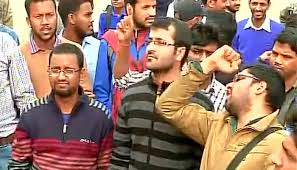 The government’s inept handling of the situation in JNU has given a fillip to secessionists in Kashmir. A lot of Kashmiris, including some in leading positions, have got the impression that substantial support for Kashmir’s independence struggle has become apparent across India.
The government’s inept handling of the situation in JNU has given a fillip to secessionists in Kashmir. A lot of Kashmiris, including some in leading positions, have got the impression that substantial support for Kashmir’s independence struggle has become apparent across India.
They think the upsurge of middle class opposition to the arrest of JNU Students Union President Kanhaiya Kumar actually signifies support for them. They have this impression since the entire imbroglio got going over a function to observe the anniversary of Afzal Guru’s hanging on 9 February – and several television channels have projected all backers of free speech as supporters of Guru.
In actual fact, a very large proportion of those who support the students’ agitation have focused on the political motivations behind the government’s approach to the issue. Its target was the entire ‘Left-liberal’ intellectual class and the ethos of JNU, rather than any actual wrongdoing.
It is now obvious to even the most blinkered right-wing nationalists (except perhaps those with an implacable political mission) that Kanhaiya Kumar did not raise anti-India slogans. Those who had anything to do with what happened at JNU already knew it from the outset. I was able to establish it through a couple of telephone calls to students the day Kanhaiya was arrested. I was told that his role that day had been to try and make peace between the agitated ABVP group, the crowd of sloganeers, and the security men.
The Delhi Police nevertheless arrested him last Friday, and promptly charged him with that most politically loaded crime, sedition. This means one of two things: either they are thoroughly incompetent, and lacked information about what had actually happened at the University (the second is unlikely), or their actions were dictated by political considerations.
Perhaps it was a bit of both, but there is little doubt that some strategists in the government seized the opportunity to try and paint the ‘Left’, and indeed the entire gamut of liberal and intellectual opinion in India, as `anti-national.’ That muddied the waters.
Students across the country, and Indian students studying elsewhere, were flabbergasted. There was an upsurge of public support for the JNU community. Most of that community united to agitate for Kanhaiya’s release and against state repression.
One student (the daughter of an outstanding army officer) who attended the march in the heart of New Delhi on Thursday told me she had nothing to do with politics and only wanted to study. But now, deeply upset over Kanhaiya’s arrest, she wanted to understand political issues.
Very little of the pan-India support for JNU endorsed the anti-India slogans raised on 9 February. But apologists of the government and several media channels projected support for JNU as support for Guru. One channel ran two labels on either side of its screen. Clips of all those who spoke for the freedom of expression, the right to dissent, or against police raids on campuses were run under the `pro Afzal’ label.
By and large, this sort of media projection seemed acceptable only to the ruling establishment’s core nationalist support base – except in Kashmir. There, large numbers got the impression that a significant proportion of Indians now support freedom for Kashmir. This is a tragic denouement. The government will have a tough time dealing with the consequences.
On Friday, a week after Kanhaiya had been arrested, there were signs that the government had moved to plan B: Kanhaiya would be released on bail next week if they could arrest Omar Rashid, the leader of the Democratic Students Union, by then.
Meanwhile, with hope still alive that a PDP-BJP government might be formed in Jammu and Kashmir in March, it appears that the Kashmiris who actually raised the slogans will still not be touched. I refer to the two specific slogans that were constantly parroted by `nationalists’ in various stages of televised apoplexy, to target Kanhaiya, JNU, the `Left,’ liberals and other defenders of free speech as `anti-national.’
They finally took a break when it was revealed on Thursday that Kanhaiya had been framed with fudged audio on video footage of him. That is when Plan B seems to have come up: Omar Rashid is to be demonized instead of Kanhaiya. That already began the moment it became clear that the ‘evidence’ against Kanhaiya had been doctored.
If this is indeed Plan B, it’s a bad one. It might turn out worse for the sort of future the conservatives backing it want than Plan A has been. It could turn Rashid into a youth icon for another wave of protests. In the bargain, it would bring the radical ideas that Rashid represents into public focus.
If this putative Plan B is handled as ham-handedly as has been the targeting of Kanhaiya and JNU, that might even give life to what is so far no more than a hope in Kashmir, that secession has support among many ordinary Indians.
Of course, the intelligence to make workable plans is not generally associated with the right wing of the human brain. But the government would be well advised to stop digging itself deeper and deeper into the mess it has made.
David Devadas





